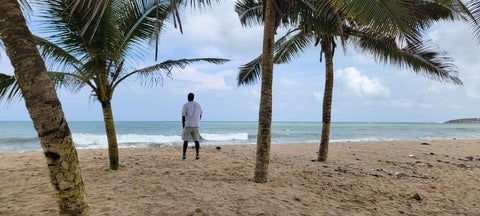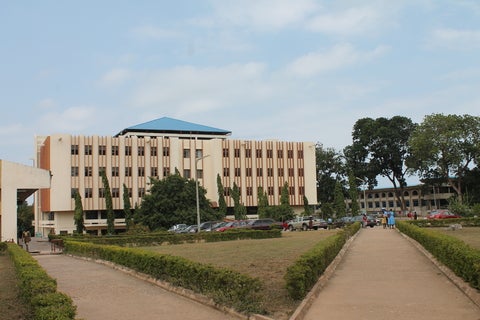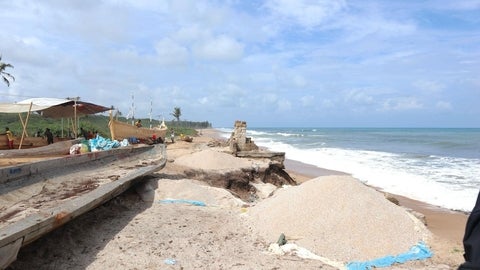
Beyond Borders: Field School in Ghana

Beyond Borders: Field School in Ghana
Beyond Borders: Field School in Ghana was a unique opportunity offered through the University of Waterloo. In summer 2025, 12 upper-year undergraduate students spent 65 days in Ghana, engaging in hands-on learning focused on critical environmental issues, cross-cultural engagement, and community collaboration.
Hosted by the University of Cape Coast (UCC) and Ashesi University, this immersive experience connected students with local knowledge, academic partners, and grassroots initiatives.
See the impact of this program on UWaterloo students, instructors, and students from Ashesi University.

Made possible by the Queen Elizabeth Scholars program
This field course is funded by QES, a program that has, for over 25 years, empowered students through academic, professional, and cross-cultural experiences.
With a focus on global leadership, community impact, and international collaboration, QES helps students take on real-world environmental challenges.
Learn more at the Queen Elizabeth Scholars website.
Our Partners in Ghana

University of Cape Coast Library
University of Cape Coast
The University of Cape Coast is a leading public research institution known for its academic excellence and vibrant campus community. Located along the scenic coast of the Atlantic Ocean, it offers a diverse range of programs and is renowned for its commitment to fostering innovation, leadership, and cultural exchange.
Ashesi University
Ashesi University is a prestigious private institution recognized for its innovative approach to education and commitment to ethical leadership. Nestled in the scenic hills of Berekuso, it offers a rigorous liberal arts curriculum designed to inspire critical thinking, entrepreneurship, and social responsibility among its diverse student body.

Ashesi University Courtyard - Photo by Alexa Bennett (instructor)

As part of the Field School in Ghana, students examined the interconnected challenges of climate change, plastic pollution, and water security through an interdisciplinary and community-engaged approach. Working alongside peers from the University of Cape Coast and Ashesi University, they participated in collaborative fieldwork, stakeholder consultations, and lab-based research focused on microplastics.

Coastal town photographed by Pascal Meho-Akakpo (TA)
Students engage directly with coastal communities, environmental organizations, and policymakers to better understand local resilience strategies and the broader impacts of environmental degradation
Through these hands-on experiences—ranging from data collection in the field to co-developing solutions in an environmental innovation challenge—students applied classroom learning to real-world contexts while developing intercultural and leadership skills.

Sacred Forest photographed by Jordan Wilton (student)
Voices from the Field
Each week students completed Knowledge Mobilization Outputs, as part of the course. Select outputs below offer a glimpse into life on the ground during the Field School in Ghana. Through blog posts, podcasts, short videos, and more, students share personal reflections, insights, and creative takes on the global issues they're exploring—connecting academic learning with real-world experience.
Meet the Team
Our Instructor

Alexa Bennett is a PhD candidate in the Department of Geography and Environmental Management (GEM) focusing on global environmental health with a particular interest in water and sanitation in low-resource contexts. She leads the Field School as the course instructor, bringing deep knowledge and field-based experience to the program.
Our Teaching Assistant

Pascal Meho-Akakpo recently completed his MA in Geography in the Department of Geography and Environmental Management (GEM) at the University of Waterloo. He joins the Field School as our teaching assistant, bringing research experience in climate change, gender, and health equity in the Global South.
Information and FAQs
Why Ghana, West Africa?
Ghana is a diverse and vibrant destination. From the beautiful beaches of Cape Coast to the scenic hills of Berekuso, there is an abundance of natural beauty to explore. The country also boasts a rich cultural heritage, with traditional festivals, historical landmarks, and lively markets offering a unique cultural experience. Ghana's welcoming people and delicious cuisine will further enhance your adventure, as well.
Additionally, Ghana is committed to addressing climate change through a number of innovative means, from overseeing climate-smart agricultural practices to encouraging local organizations to engage in sustainable solutions. It is not only a place to experience adventure and culture, but also to gain environmental awareness, culminating in a a truly memorable experience.
How will this project impact local and global communities?
By working closely with experts from UCC and AU, you will explore the detrimental effects of plastic pollution and climate change on fishing communities. Those collaborative efforts will lead to a deeper understanding of the needs and wellbeing of Ghanian communities, as well as generate and share valuable knowledge and best practices.
Additional information
How does this program benefit me?
In addition to engaging in hands-on experiences and collaborative projects with local institutions to tackle real world problems and create lasting change, you will also earn 2.0 credits (ENVS 476C for 1.50 units and SCI 300 for 0.50 units) which is equivalent to 4 standard courses.
Note: this is a fully graded course, so you will receive a percentile grade at the end
Am I eligible?
Candidates for this program must satisfy the following requirements:
- In 3rd or 4th year of an undergraduate program at the University of Waterloo
- If you will have completed 4 study terms, you are eligible
- Canadian citizen or permanent resident
- Less than 35 years old
When will this program take place?
The field school will run for a total of 65 days, with students spending the first half of the program at AU and the second half at UCC.
Note: These may change without notice as we negotiate with our Ghanian partners at University of Cape Coast and Ashesi University.
- Travel to Ghana (2 days)
- Tuesday 3 June 2025 - Wednesday 4 June 2025
- University of Cape Coast (31 days)
- Wednesday 4 June 2025 - Sunday 6 July 2025
- Ashesi University (30 days)
- Sunday 6 July 2025 - Wednesday 6 August 2025
- Departure to Canada (2 days)
- Wednesday 6 August 2025 - Thursday 7 August 2025
Where will I stay?
TBD
How much does this program cost?
All costs associated with the logistics of this program are covered by the Queen Elizabeth Scholarship, meaning students do not need to pay for their flights, meals, or accommodations. That said, if students wish to purchase additional items, such as souvenirs, they will need to use their personal funds.
Predeparture Timeline
-
2025
-
Mar
-
Q & A Session
Interested in learning more about this program? Have questions you want answered? Attend this Q & A session on Monday, March 10 from 4:30 to 5:00 PM in Environment 1, room 221 (EV1 221).
Note: this session is in-person only meaning it will not be recorded or streamed live
-
Application Deadline
Applications will no longer be accepted after 11:59 PM on Friday, March 21. (Update: The deadline has been extended to Sunday, March 23 at 11:59 PM) Don't wait until the last minute, apply today!
-
Decisions Announced
Applicants will be notified of their acceptance status on Friday, March 28. Regardless of the outcome, everyone who applies to this program will receive a decision from the application committee.
-
-
Apr
-
Information Session
All those who were accepted to this program will attend an information session on Thursday, April 17th at 12PM in Environment 1, room 221 (EV1 221). This session will provide additional information on participant expectations, travel and accommodation details, and other logistics.
This will be followed by further predeparture preparation. More information is to come, so stay tuned!
-
Application Deadline #2
Applications will be accepted until Sunday, April 20th at 11:59PM and will be accepted on a rolling basis. Don't wait until the last minute, apply today!
-
-
Jun
-
Travel to Ghana
Time to leave! You will officially depart on Wednesday, June 3 with your first stop being the University of Cape Coast in Cape Coast, Ghana.
Please see "When will this program take place?" (above) for more information on departure and arrival dates.
-
-
Mar
Frequently asked questions
What are the expected dates of travel?
Please note these may change without notice as we negotiate with our Ghanian partners at University of Cape Coast and Ashesi University.
- Travel to Ghana (2 days)
- Wednesday 4 June 2025 - Thursday 5 June 2025
- University of Cape Coast (30.5 days)
- Friday 6 June 2025 - Monday 7 July 2025
- Travel from UCC to Ashesi on Monday 7 July 2025
- Ashesi University (30.5 days)
- Monday 7 July 2025 - Tuesday 5 August 2025
- Travel to Canada (2 days)
- Wednesday 6 August 2025 - Thursday 7 August 2025
Is Ghana safe?
The Government of Canada has placed Ghana at a Level 2 in terms of risk and recommends individuals travelling to Ghana exercise a high degree of caution due to the increased potential for crime. The Government of Canada website also details information regarding: risk level; safety and security; entry and exit requirements; health; laws and culture; and natural disasters and climate.
Will there be opportunities to connect with the locals?
Yes, outreach events have been incorporated into the programming, allowing you to meet and connect with local Ghanaians as you work to achieve a common goal. You will also have the opportunity to explore the city in your free time and connect with locals that way.
What is the time commitment?
The Field Course is a full-time commitment. Exact hours may vary each day, but generally, on weekdays, you will attend lectures in the morning followed by community engagement outings in the afternoon. On evenings and weekends, you will be given the opportunity to explore your free time as you see fit. There may be group-led activities scheduled here and there on evenings and weekends, but there will not be any academic programming scheduled on the weekend.
Will the meals be adjusted to accommodate participants with dietary restrictions?
For the most part, yes, we will accommodate dietary restrictions. That said, depending on the nature of the restriction and the meals in question, we may not always be able to guarantee an accommodation will be made. For more information, please email beyondb@uwaterloo.ca.
Can students from any faculty apply?
Absolutely! Although this field school is primarily designed to target students from the Faculty of Environment and the Faculty of Science, all students are encouraged to apply, regardless of their faculty. The deadline to apply for the second round is April 20th at 11:59 PM.
Can students outside of 3rd and 4th year undergrad apply, including graduate students?
The Field Course is designed for students who have completed at least 4 study terms (3rd and 4th year students). Graduate students may apply for this course, however, undergraduate students who do not meet these requirements are not eligible.
Who will be responsible for participants' safety while abroad?
We will be with the University of Waterloo's Safety Abroad team to ensure your safety while abroad. The Safety Abroad team will also teach you how to use Anvil Group which includes a 24/7 dedicated travel safety assistance phone line and email that you can contact for help with any emergency medical, security, or travel situation that you encounter. Your safety is our top priority.
In addition, the Field Course will have two UWaterloo instructors on the ground for the duration of the course. We will also be working with our institutional partners throughout.
What will participants do in their free time?
You are encouraged to explore the surrounding community and fully immerse yourself into the Ghanaian culture. Cape Coast is rich in history. It was once a major centre for the transatlantic slave trade and now houses a UNESCO World Heritage site. Berekuso is a more rural area, providing you with the chance to escape the hustle and bustle of Ghana's main cities. Located in the foothills of Aburi Ridge, Berekuso is also a great place to go hiking.
Will there be training on how to adapt to and be respectful of the Ghanaian culture?
Yes, prior to departure you will be expected to complete pre-departure training led by the University of Waterloo's Safety Abroad team. This will teach you everything you need to know about travelling to another country and immersing yourself in a new culture.
Ghanaians are very welcoming and accommodating. Many people will ask you for your name and you will make many friends on the street. Politeness is highly valued and will lead to a wonderful experience.
Will participants still need to pay course tuition?
Yes, tuition for the courses ENVS 476C for 1.50 units and SCI 300 for 0.50 units will be calculated once the student has been accepted and enrolled in these Waterloo courses associated with the Beyond Borders Field School in Ghana.
The funding received under the Queen Elizabeth Scholarship program will be used to pay for approved and select travel expenses arranged by Waterloo such as flight, accommodation, and meals.
Tuition fees may also vary between participants. To determine how much you will be charged for tuition, please visit the University of Waterloo's Tuition Fee Schedule webpage.
Accessibility considerations
The Field Course will be a mixture of indoor and outdoor experiences. As such, exposure to varying weather conditions and terrain are to be expected. Course instructors will work with Accessibility Services to increase chances of a successful trip experience.
Missed the 2025 Field School in Ghana?
Missed the 2025 Field School in Ghana?
Good news — the Field School will run again next year! Check back here and follow the Faculty of Science and Environment social media channels for updates on the applications in the coming months.
CONTACT US
Have questions? Email us beyondb@uwaterloo.ca.
Photo Credits
- Banner Photos of Cape Coast by Ethan Scott (student)
- "Broadening Perspectives through Experiential Learning" banner by Banujah Theivendrarajah (student)